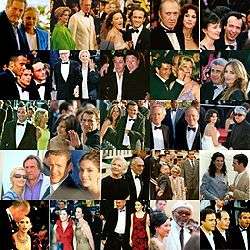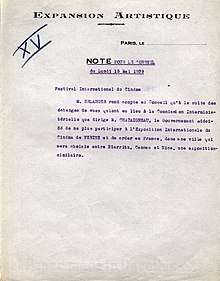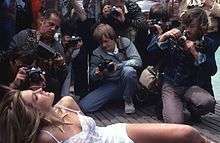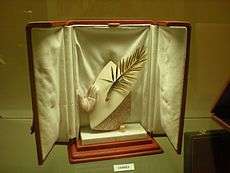Cannes Film Festival
The Cannes Festival (/kæn/; French: Festival de Cannes), until 2003 called the International Film Festival (Festival international du film) and known in English as the Cannes Film Festival, is an annual film festival held in Cannes, France, which previews new films of all genres, including documentaries, from all around the world. Founded in 1946, the invitation-only festival is held annually (usually in May) at the Palais des Festivals et des Congrès.[1]
 | |
 | |
| Location | Cannes, France |
|---|---|
| Founded | 20 September 1946 (as International Film Festival) |
| Awards | Palme d'Or, Grand Prix |
| Website | www |
On 1 July 2014, co-founder and former head of French pay-TV operator Canal+, Pierre Lescure, took over as President of the Festival, while Thierry Frémaux became the General Delegate. The board of directors also appointed Gilles Jacob as Honorary President of the Festival.[2][3]
It is one of the "Big Five" film festivals, alongside the Venice Film Festival in Italy, the Berlin International Film Festival in Germany, the Toronto International Film Festival in Canada and the Sundance Film Festival in the United States.[4][5][6] The Big Five are internationally acclaimed for giving creators the artistic freedom to express themselves through film.[7] In 1951, FIAPF formally accredited the festival.[8]
History
The early years

The Cannes Film Festival has its origins in 1938 when Jean Zay, the French Minister of National Education, on the proposal of high-ranking official and historian Philippe Erlanger and film journalist Robert Favre Le Bret decided to set up an international cinematographic festival. They found the support of the Americans and the British.
Its creation can be largely attributed to the French desire to compete with the Venice Film Festival, which at the time was the only international film festival and had shown a lack of impartiality with its fascist bias during those years.[9] The political interference seemed evident in the 1937 edition when Benito Mussolini meddled to ensure that French pacifist film La Grande Illusion would not win.[10]
The last straw was in the 1938 event when Mussolini and Adolf Hitler respectively overruled the jury's decision in order to award the Coppa Mussolini (Mussolini Cup) for the Best film to Italian war film Luciano Serra, Pilot, produced under the supervission of Mussolini's son, and the Coppa Mussolini for the Best foreign film to Olympia, a German documentary film about the Berlin 1936 Summer Olympics produced in association with the Nazi Ministry of Public Enlightenment and Propaganda despite the fact that the regulations at that time prohibited awarding a documentary.
Outraged by the decision and as a measure of protest, the French, British, and American jury members decided to withdrew from the festival with the intention of not returning.[11] This snub encouraged the French to found a free festival. Thus, on May 31, 1939, the city of Cannes was finally selected as the location for the festival over Biarritz and the town hall along with the French government signed the International Film Festival’s official birth certificate with the name of Le Festival International du Film.[12]
The reason for deciding Cannes was because of its touristic appeal as a French Riviera resort town and also because the city hall offered to increase the municipality’s financial participation, including the commitment of building a dedicated venue for the event. The first edition was planned to be held from 1 to 20 September 1939 in an auditorium at the Municipal Casino and Louis Lumière was going to be the honorary president. Its aim was "encouraging the development of all forms of cinematographic art and foster a spirit of collaboration between film-producing countries".[11]
Hollywood stars of the moment like Gary Cooper, Cary Grant, Tyrone Power, Douglas Fairbanks Jr., Mae West, Norma Shearer, Paul Muni, James Cagney, Spencer Tracy, and George Raft arrived thanks to an Ocean liner chartered by the Metro-Goldwyn-Mayer (MGM). On 31 August, the opening night gala took place with the private screening of the American film The Hunchback of Notre Dame starring Charles Laughton and Maureen O'Hara and directed by William Dieterle. The next day, on September 1, German troops invaded Poland. As a result, the festival was postponed for 10 days and it would be resumed if the circumstances allowed it.[12] However, the situation only worsened and on September 3, France and the United Kingdom declared the war against Germany which sparked the Second World War. The French government ordered a general mobilization and this prevented the festival from continuing so it was finally cancelled.[13]
In 1946, the festival was relaunched and from 20 September to 5 October 1946, twenty-one countries presented their films at the First Cannes International Film Festival, which took place at the former Casino of Cannes.[14] In 1947, amid serious problems of efficiency, the festival was held as the "Festival du film de Cannes", where films from sixteen countries were presented. The festival was not held in 1948 and 1950 due to budgetary problems.
In 1949, the Palais des Festivals was expressly constructed for the occasion on the seafront promenade of La Croisette, although its inaugural roof, while still unfinished, blew off during a storm. In 1951, the festival was moved to spring to avoid direct competition with the Venice Festival which was held in autumn.[13]
1950s and 1960s
During the early 1950s, the festival attracted much tourism and press attention, with showbiz scandals and high-profile personalities' love affairs. At the same time, the artistic aspect of the festival started developing. Because of controversies over the selection of films, the Critics' Prize was created for the recognition of original films and daring filmmakers. In 1954, the Special Jury Prize was awarded for the first time. In 1955, the Palme d'Or was created, replacing the Grand Prix du Festival which had been given until that year. In 1957, Dolores del Río was the first female member of the jury for the official selection.[15]
In 1959, the Marché du Film (Film Market) was founded, giving the festival a commercial character and facilitating exchanges between sellers and buyers in the film industry. Today it has become the first international platform for film commerce. Still, in the 1950s, some outstanding films, like Night and Fog in 1956 and Hiroshima, My Love in 1959 were excluded from the competition for diplomatic concerns. Jean Cocteau, three times president of the jury in those years, is quoted to have said: "The Cannes Festival should be a no man's land in which politics has no place. It should be a simple meeting between friends."[16][17]
In 1962, the International Critics' Week was born, created by the French Union of Film Critics as the first parallel section of the Cannes Film Festival. Its goal was to showcase first and second works by directors from all over the world, not succumbing to commercial tendencies. In 1965 Olivia de Havilland was named the first female president of the jury, while the next year Sofia Loren became president.[18]
The 1968 festival was halted on 19 May. Some directors, such as Carlos Saura and Miloš Forman, had withdrawn their films from the competition. On 18 May filmmaker Louis Malle along with a group of directors took over the large room of the Palais and interrupted the projections in solidarity with students and labour on strike throughout France,[19] and in protest to the eviction of the then President of the Cinémathèque Française. The filmmakers achieved the reinstatement of the President, and they founded the Film Directors' Society (SRF) that same year.[20] In 1969 the SRF, led by Pierre-Henri Deleau created the Directors' Fortnight (Quinzaine des Réalisateurs), a new non-competitive section that programs a selection of films from around the world, distinguished by the independent judgment displayed in the choice of films.[21]
1970s and 1980s
During the 1970s, important changes occurred in the Festival. In 1972, Robert Favre Le Bret was named the new President, and Maurice Bessy the General Delegate. He introduced important changes in the selection of the participating films, welcoming new techniques, and relieving the selection from diplomatic pressures, with films like MASH, and later Chronicle of the Years of Fire marking this turn. In some cases, these changes helped directors like Tarkovski overcome problems of censorship in their own country.[22] Also, until that time, the different countries chose the films that would represent them in the festival. Yet, in 1972, Bessy created a committee to select French films, and another for foreign films.[23]
In 1978, Gilles Jacob assumed the position of General Delegate, introducing the Caméra d'Or award, for the best first film of any of the main events, and the Un Certain Regard section, for the non-competitive categories. Other changes were the decrease of length of the festival down to thirteen days, thus reducing the number of selected films; also, until that point the Jury was composed by Film Academics, and Jacob started to introduce celebrities and professionals from the film industry.[24]
In 1983, a new, much bigger Palais des Festivals et des Congrès was built to host the festival, while the Directors' Fortnight remained in the old building. The new building was nicknamed "The Bunker", provoking much criticism, especially since it was hardly finished at the event and several technical problems occurred.[25] In 1984 Pierre Viot replaced Robert Favre Le Bret as President of the Festival.[26] In his term, the Festival started including films from more countries, like Philippines, China, Cuba, Australia, India, New Zealand and Argentina. In 1987, for the first time of the Festival, a red carpet was placed at the entrance of the Palais. In 1989, during the first Cinéma & liberté forum, hundred directors from many countries signed a declaration "against all forms of censorship still existing in the world".[27]

1990s to present
In 1998, Gilles Jacob created the last section of the Official Selection: la Cinéfondation, aiming to support the creation of works of cinema in the world and to contribute to the entry of the new scenario writers in the circle of the celebrities.[28] The Cinéfondation was completed in 2000 with La Résidence, where young directors could refine their writing and screenplays, and in 2005 L'Atelier, which helps twenty directors per year with the funding of their films. Gilles Jacob was appointed Honorary President in 2000, and in 2002, the Festival officially adopted the name Festival de Cannes.[29][30]
During the 2000s, the Festival started focusing more on the technological advances taking place in the film world, especially the digital techniques. In 2004 the restored historical films of the Festival were presented as Cannes Classics, which included documentaries. In 2007 Thierry Frémaux became General Delegate. In 2009 he extended the Festival in Buenos Aires, as La Semana de Cine del Festival de Cannes, and in 2010 he created the Cannes Court Métrage for the Short Film competition.
2020 edition
On March 20, 2020, organizers announced the postponement of the Cannes Film Festival 2020 due to the COVID-19 pandemic.[31] Spike Lee, director of “Do The Right Thing” and “BlacKkKlansman,” had been chosen to the lead the jury panel. In 2019, the jury panel was lead by Alejandro González Iñárritu, director of “Birdman”.[32]
Controversies
In recent years, a number of gender and sexual controversies has surrounded the Cannes Film Festival. These include "Heelgate" in which numerous female attendees of a red carpet premiere were stopped from entering in 2015 for wearing flat soled shoes instead of high heels.[33] The incident caused numerous female celebrities to wear flat soled shoes or no shoes at all to other red carpet premiers in a show of solidarity and protest.[34]
A number of high-profile directors and producers have also been accused of sexual harassment and abuse at past festivals.
As a result of the past sexual controversies and the #MeToo movement that arose out of the Harvey Weinstein scandal, in 2018, Cannes Film Festival officials announced the creation of a telephone hotline during the festival in which victims could report incidents of sexual harassment and other crimes.[35] The hotline is in collaboration with the French government.[36]
General Delegate Thierry Frémaux reportedly 'banned' selfies on the red carpet of the festival in 2015.[37]
In 2017, along with the 70th anniversary events of the Festival, the issue of changing the rules on theatrical screening caused controversy.[38] In 2018, the enforcement of theatrical screening in France resulted in Netflix withdrawing their films from the festival.[39]
Festival team
| Year | President | General Delegate | General Secretary | |
|---|---|---|---|---|
| 1949 | – | – | Jean Touzet | |
| 1952 | Robert Favre Le Bret | |||
| 1972 | Robert Favre Le Bret |
Maurice Bessy | ||
| 1978 | Gilles Jacob | |||
| 1984 | Pierre Viot | |||
| 1985 | Michel P. Bonnet | |||
| 1991 | François Erlenbach | |||
| 2001 | Gilles Jacob | General Director Véronique Cayla |
Artistic Delegate Thierry Frémaux | |
| 2005 | Catherine Démier | |||
| 2007 | Thierry Frémaux | |||
| 2014 | Pierre Lescure | |||
| 2017 | ||||
The President of the Festival, who represents the Festival in front of financial partners, the public authorities and the media, is elected by the board of directors of the Festival, officially named the "French Association of the Film Festival".
The Board is composed of authorities of the world of cinema, as well as of public authorities which subsidize the event. The President has a renewable 3-year mandate and appoints the members of his team, including the General Delegate, with the approval of the board of directors.[40] Sometimes a President, after his last term, becomes the Honorary President of the Festival.
The General Delegate is responsible for the coordination of the events. When Gilles Jacob passed from General Delegate to the position of the President, in 2001, two new positions were created to take over his former post, the General Director to oversee the smooth running of the event, and the Artistic Director, responsible for the selection of films. However, in 2007, the Artistic Director Thierry Frémaux, became again the General Delegate of the Festival.
The general secretary is responsible for the reception of works and other practical matters.
Programmes
The Cannes Film Festival is organised in various sections:[41]
- The Official Selection – The main event of the festival.
- In Competition – The films competing for the Palme d'Or. They are projected in the Théâtre Lumière.
- Un Certain Regard – Films selected from cultures near and far; original and different works. They are projected at the Salle Debussy.
- Out of Competition – These films are also projected in the Théâtre Lumière but do not compete for the main prize.
- Special Screenings – The selection committee chooses for these films an environment specially adapted to their particular identity.
- Cinéfondation – About fifteen shorts and medium-length motion pictures from film schools over the world are presented at the Salle Buñuel.
- Short Films – The shorts competing for the Short Film Palme d'Or are presented at Buñuel and Debussy theatres. There are approximately 10 films in this competition.
- Cannes Classics – It celebrates the heritage of film, aiming to highlight works of the past, presented with brand new or restored prints.
- Cinéma de la Plage – Screening of Cannes Classics and Out of Competition films for the mass public on Macé beach, preceded by a programme dedicated to film music.
- Parallel Sections – These are alternative programmes dedicated to discovering other aspects of cinema.
- International Critics' Week – Since 1962, it has focused on discovering new talents and showcasing first and second feature films by directors from all over the world.
- Directors' Fortnight – Since 1969, it has cast its lot with the avant-garde, even as it created a breeding ground where the Cannes Festival would regularly find its prestigious auteurs.
- ACID (Association for Independent Cinema and its Distribution)
- Tous les Cinémas du Monde – It showcases the vitality and diversity of cinema across the world. Each day, one country is invited to present a range of features and shorts in celebration of its unique culture, identity and recent film works.
- Events
- Marché du Film – The busiest film market in the world.
- Masterclasses – Given in public by world-renowned filmmakers.
- Tributes – Honors internationally renowned artists with the presentation of the Festival Trophee following the screening of one of their films.
- Producers Network – An opportunity to make international co-productions.
- Exhibitions – Each year, an artist, a body of work or a cinematographic theme becomes the focus of an exhibition that diversifies or illustrates the event's programme.
- 60th Anniversary – Events organised in 2007 dedicated to the 60th anniversary of the Festival.
Juries
Prior to the beginning of each event, the Festival's board of directors appoints the juries who hold sole responsibility for choosing which films will receive a Cannes award. Jurors are chosen from a wide range of international artists, based on their body of work and respect from their peers.[42] The appointment of the President of the Jury is made following several annual management proposals made in the fall and submitted to the Festival's board of directors for validation.[43]
- Feature Films – An international jury composed of a President and various film or art personalities, who determine the prizes for the feature films in Competition.
- Cinéfondation and Short Films – Composed of a President and four film personalities. It awards the Short Film Palme d'Or as well as the three best films of the Cinéfondation.
- Un Certain Regard – Composed of a President, journalists, students in cinema, and industry professionals. It awards the Un Certain Regard Prize for best film and can, moreover, honour two other films.
- Caméra d'Or – Composed of a President, as well as film directors, technicians, and French and international critics. They award the best film in any category.
The jury meets annually at the historic Villa Domergue to select the winners.[44]
Awards


The most prestigious award given at Cannes is the Palme d'Or ("Golden Palm") for the best film.
- Competition
- Palme d'Or – Golden Palm
- Grand Prix – Grand Prize of the Festival
- Prix du Jury – Jury Prize
- Palme d'Or du court métrage – Best Short Film
- Prix d'interprétation féminine – Best Actress
- Prix d'interprétation masculine – Best Actor
- Prix de la mise en scène – Best Director
- Prix du scénario – Best Screenplay
- Other Sections
- Prix Un Certain Regard – Young talent, innovative and audacious works
- Cinéfondation prizes – Student films
- Caméra d'Or – It rewards the best first film of the Festival, choosing among the debutants' works among the Official Selection, the Directors' Fortnight and the International Critics' Week selections.
- Given by Independent Entities
- FIPRESCI Prize – The International Federation of Film Critics awards prizes to films from the main competition section, Un Certain Regard and parallel sections
- Directors' Fortnight Prizes
- Prix Vulcain – Awarded to a technical artist by the CST
- International Critics' Week Prizes
- Prize of the Ecumenical Jury
- François Chalais Prize
- L'Œil d'or – Best documentary film
- Trophée Chopard
- Palm Dog – Best canine performance[45]
- Queer Palm – Best LGBT-related films[46]
- Cannes Soundtrack Award
- Pierre Angénieux Excellens in Cinematography
Impact
The festival has become an important showcase for European films. Jill Forbes and Sarah Street argue in European Cinema: An Introduction (ISBN 0333752104), that Cannes "became...extremely important for critical and commercial interests and for European attempts to sell films on the basis of their artistic quality" (page 20).[47] Forbes and Street also point out that, along with other festivals such as the Venice Film Festival and Berlin International Film Festival, Cannes offers an opportunity to determine a particular country's image of its cinema and generally foster the notion that European cinema is "art" cinema.[47]
Additionally, given massive media exposure, the non-public festival is attended by many stars and is a popular venue for film producers to launch their new films and to attempt to sell their works to the distributors who come from all over the globe.
Cannes Film Festival in fiction
Though most of the media attention the festival receives is journalistic in nature, the festival has been explored from the standpoint of fiction by novelists over the years.
J. G. Ballard's Super-Cannes is about the European elite who live in a closed society by the festival. Michael Grothaus’ Epiphany Jones is a social satire about the festival and film industry and explores sex trafficking that occurs during the festival. The book was named one of the best Hollywood novels of all time by Entertainment Weekly.[48] Iain Johnstone's Cannes: The Novel is a dystopian tale about terrorists holding the festival hostage.
In addition to fictional works, the festival has been examined in contexts ranging from the cultural to the historical in a host of non-fiction books.[49]
See also
References
- "Presentation of the Palais". palaisdesfestivals.com. Retrieved 31 May 2017.
- "Cannes Film Festival Names Pierre Lescure President". The Hollywood Reporter. Retrieved 14 January 2014.
- "Pierre Lescure elected President of the Festival de Cannes". Festival de Cannes. Archived from the original on 26 March 2016. Retrieved 28 March 2015.
- Scott Roxborough. "Berlin Rebooted: Festival Shuffles Lineup, Aims for Recharged Market". The Hollywood Reporter.
- Anderson, Ariston. "Venice: David Gordon Green's 'Manglehorn,' Abel Ferrara's 'Pasolini' in Competition Lineup". The Hollywood Reporter. Retrieved 9 September 2018.
- "Addio, Lido: Last Postcards from the Venice Film Festival". Time. Retrieved 9 September 2018.
- Chan, F. (1 June 2011). "The international film festival and the making of a national cinema". Screen. 52 (2): 253–260. doi:10.1093/screen/hjr012.
- Moeran, Brian; Jesper, Strandgaard Pedersen (2011). Negotiating Values in the Creative Industries: Fairs, Festivals and Competitive Events. Cambridge: Cambridge University Press. p. 173. ISBN 978-1-107-00450-4.
- "First Cannes Film Festival". history.com. Archived from the original on December 27, 2013.
- Giorgi, Liana; Sassatelli, Monica; Delanty, Gerard (2011). Festivals and the Cultural Public Sphere. Abingdon-on-Thames: Routledge. ISBN 978-0-415-58730-3.
- Crouse, Richard (2005). Reel Winners: Movie Award Trivia. Toronto: Dundurn Press. p. 38. ISBN 978-1-55002-574-3.
- "History of the Cannes Film Festival". City of Cannes. Retrieved 15 March 2020.
- "1938–1951: The birth of the Festival". fresques.ina.fr. Retrieved 28 May 2017.
- "1st Cannes Film Festival". Archived from the original on October 20, 2013. Retrieved 20 October 2013.
- "Honoring the Female Trailblazers of Cannes /2. Dolores del Río". harpersbazaar.com. Retrieved 31 May 2017.
- "Festival de Cannes – Festival History". festival-cannes.fr. Archived from the original on 14 May 2007.
- "1952–1959: Celebrities, politics and the film world". fresques.ina.fr. Retrieved 28 May 2017.
- "1960–1968: The growing legitimacy of cinema and a world of new horizons". fresques.ina.fr. Retrieved 28 May 2017.
- "1968 Cannes Festival". cannes-fest.com. Retrieved 28 May 2017.
- "The Fortnight in action". quinzaine-realisateurs.com. Archived from the original on 15 May 2017. Retrieved 28 May 2017.
- "Directors' Fortnight". Directors' Fortnight website. Archived from the original on 23 May 2017. Retrieved 27 May 2017.
- "1969–1977: A Festival that moves with the times". fresques.ina.fr. Retrieved 30 May 2017.
- "1972 – Tout le monde il est beau, tout le monde il est gentil". cannes-fest.com. Retrieved 28 May 2017.
- "1978 – Cannes, Le Retour". Cannes-fest.com. Retrieved 28 May 2017.
- "1983 – Le Festival blessé". Cannes-fest.com archive. Retrieved 28 May 2017.
- "1978–1986: A wind of change". fresques.ina.fr. Retrieved 28 May 2017.
- "The History of the Festival / The 80s: The Modern Era". festival-cannes.com. Retrieved 31 May 2017.
- "Presentation". Cinéfondation. Archived from the original on 29 May 2017. Retrieved 28 May 2017.
- "1987–1996: The first Palme d'Or for a woman director". fresques.ina.fr. Retrieved 28 May 2017.
- "1997-today: The Festival enters a new century". fresques.ina.fr. Retrieved 28 May 2017.
- Marshall, Alex (19 March 2020). "Cannes Film Festival Postponed Over Coronavirus Concerns". The New York Times. ISSN 0362-4331. Retrieved 29 March 2020.
- Marshall, Alex (14 January 2020). "Spike Lee to Head Cannes Film Festival Jury". The New York Times. ISSN 0362-4331. Retrieved 29 March 2020.
- Film, Telegraph (9 May 2016). "Heelgate and beyond: 13 controversial Cannes moments". The Telegraph. ISSN 0307-1235. Retrieved 5 May 2018.
- "Controversy at Cannes: When the festival made news for all the wrong reasons". hindustantimes.com. 16 May 2017. Retrieved 5 May 2018.
- Keslassy, Elsa (27 April 2018). "Cannes Film Festival to Create Hotline for Sexual Harassment Victims (Report)". Variety. Retrieved 5 May 2018.
- "Cannes film festival to open anti-sexual predator hotline". RFI. 27 April 2018. Retrieved 5 May 2018.
- "'I am so Pathetic: I Took a Selfie at the Red Carpet' at the Cannes Film Festival=Ikon London Magazine". Retrieved 17 May 2017.
- "Netflix Defends Strategy at Cannes: 'The Culture Is Changing'". nytimes.com. Retrieved 31 May 2017.
- Chiu, Allyson (26 March 2018). "Cannes Film Festival bans Netflix films from competition. Also, no more selfies". The Washington Post. Retrieved 12 April 2018.
- "Pierre Lescure officiellement à la tête du Festival de Cannes". LeMond.fr (in French). Retrieved 30 May 2017.
Le président du Festival de Cannes est élu par le conseil d'administration de l'Association française du Festival international du film. Cette instance compte vingt-huit membres et repose sur un subtil équilibre entre le monde du cinéma et les pouvoirs publics, qui subventionnent l'événement.
- "Festival de Cannes – Official Site". Retrieved 28 May 2017.
- "Festival de Cannes: Juries". festival-cannes.com. Archived from the original on 27 September 2007.
- "Festival de Cannes: Juries". festival-cannes.com. Archived from the original on 18 April 2015.
- "Patrimoine: Villa Domergue". Site officiel de la Ville de Cannes. Retrieved 6 July 2017.
- "Pixar pooch picks Up Cannes prize". BBC News. 22 May 2009. Retrieved 27 May 2009.
- "Transgender activist Pascale Ourbih on Cannes gay prize jury". On Top Magazine. 10 May 2010. Retrieved 28 May 2017.
- Forbes, Jill; Street, Sarah (2001). European Cinema: An Introduction. London: Macmillan Publishers. ISBN 0-333-75210-4.
- "The most irresistible Hollywood novels". EW.com. Retrieved 11 October 2018.
- "16 Books About Cannes Film Festival you Have to Read - Cannes Estate". Cannes Estate. 6 July 2018. Retrieved 11 October 2018.
Further reading
- Coyle, Jake (10 May 2017). "Outcry over Netflix films prompts Cannes to change rules". CBC/Radio-Canada.
- Ford, Rebecca; Roxborough, Scott (17 May 2017). "Why Awards Hopefuls Are Losing Confidence in Cannes Debuts". The Hollywood Reporter.
- Mumford, Gwilym (17 May 2017). "Concrete flowerpots and drone killers: Cannes opens with beefed-up security". The Guardian.
- Books
- Craig, Benjamin (2018). Cannes: A Festival Virgin's Guide (7 ed.). Cinemagine Media Publishing. ISBN 978-1999996109.
- Bart, Peter; The Editors of Variety (1997). Cannes: Fifty Years of Sun, Sex & Celluloid: Behind the Scenes at the World's Most Famous Film Festival. Miramax Books. ISBN 978-0786882953.
- Beauchamp, Cari; Behar, Henri (1992). Hollywood on the Riviera: The Inside Story of the Cannes Film Festival. William Morrow and Company. ISBN 978-0688110079.
- Jungen, Christian (2015). Hollywood in Canne$: The History of a Love-Hate Relationship (Film Culture in Transition). Amsterdam University Press. ISBN 978-9089645661.
Media
External links
| Wikimedia Commons has media related to Cannes Film Festival. |
- Cannes Film Festival official website (in English)
- Cannes Film Festival at the Internet Movie Database
- The History of the Festival at the official website
- Festival de Cannes at the official website of tourism in France 2017 (in French)
- Cannes – A Festival Virgin's Guide – Detailed festival history and information for attendees
- Radio France Internationale coverage of the Cannes Film Festival 2017 (in English)
- Cannes Film Festival unofficial blog
- Cannes Film Festival: A Potted History
- Cannes Film Festival at Curlie